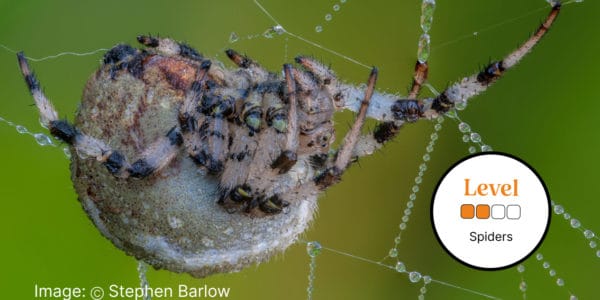There are over 650 spider species in the British Isles and despite being an invertebrate that is commonly found in our homes and gardens, relatively few people know how to identify the different species.
Join our tutor to discuss the identification features of a variety of UK spider species that can be identified in the field. During this beginner course, you will be introduced to more advanced morphological features which will aid with the accurate identification of 8 of the UK’s spider families, 8 distinctive genera and 10 distinctive species of spiders found in Britain.
What topics are covered in this course?
- Spider Field ID Features
- Distinctive Spider Families
- Identifying Distinctive Species in the Field
- Distinctive Genera and Recording Spiders



Read More
Learn about the different groups of spiders and how to tell them apart, including Jumping Spiders (Salticidae), Comb-footed Spiders (Theridiidae), Crab Spiders (Thomisidae) Orbweb Spiders (Araneidae), Wolf Spiders (Lycosidae), and Long-jawed Orbweb Spiders (Tetragnathidae), among others.
This course will give you an introduction to the identification of distinctive spider families and species.
This course discusses the use of the Field Studies Council fold-out Guide to House and Garden Spiders by Bee and Lewington, and Britain’s Spiders: A Field Guide by Bee, Oxford and Smith (Second edition) although neither are necessary to complete the course.
This is a 4-week online course covering 4 topics, for which you will complete a variety of self-led online resources and activities. Each topic is then concluded with an interactive Zoom workshop to complement the online content. Time commitment is approximately 3-5 hours a week and an E-certificate is provided upon completion.
What is covered in this course?
- Spider Field ID Features: The first week begins with an introduction to spider eye orientation and general morphological features that will aid with Identification. We also introduce some of collection methods used to find and record spiders.
- Distinctive Spider Species: The second week introduces features allowing the identification of taxonomic spider families commonly encountered by beginners. We also look at UK species which are the only representatives of their family in the UK.
- Distinctive species : Building on the features and families discussed in week one, learners will look at the identification of 10 species commonly encountered in the UK and the features used to separate them reliably within the field. This week also looks at some of the spider publications available for further self-study and the efficient use of each resource.Please be aware that there is a southern distribution bias of these distinctive species.
- Distinctive Genera & Recording Spiders: This topic covers some of the distinctive spider genera encountered in the UK. This topic also covers why recording spiders is important, what kind of information should be included in species records and where records can be submitted.
Who Should Attend? – Nature enthusiasts, Students, Rangers, Early career ecologists, citizen scientists.
Knowledge Level – Beginner. Level descriptors can be found on the following web page: Framework and Course Level Descriptors.
Prior Knowledge – We recommend attendees have the basic knowledge of how to reliably split spiders from other taxonomic groups and have a basic understanding of spider morphology. This information is contained within our online ‘Discovering spiders’ course.
Please note that bookings will close 2 working days before the course start date to allow for all participants to be enrolled to the online platform – bookings will not be taken after this time. Bookings will close sooner if course capacity is reached
Understand how our online courses are delivered.
Live Webinar Information
There are 4 webinars for this course, taking place weekly. Please see the date listing below for the day and time.
Please note – webinars will be recorded and uploaded to the virtual learning platform for learners unable to attend.
Tutor Information
Martin Frost
Martin has been interested in spiders for longer than he can remember, but his interest in identifying and recording them really kicked off when attending a course run by a predecessor project to FSC BioLinks. He has led multiple public education events related to spiders and has a wider interest in natural history. He has a number of green-fanged tube-web spiders (Segestria florentina) living in his garden.
Example Timetable
Week 1: Spider Field ID Features
Self-study material available at course start date
Week 1 live webinar
Week 2: Distinctive Spider Families
Self-study material available: after week 1 webinar
Week 2 live webinar at end of week 2
Week 3: Distinctive Spider Species
Self-study material available after week 2 webinar
Week 3 live webinar at end of week 3
Week 4: Distinctive Genera & Recording Spiders
Self-study material available after week 3 webinar
Week 4 live webinar at end of week 4
Time commitment: This course will require approximately 3-5 hours of your time each week. This includes covering course materials on our Moodle learning platform and the zoom session.
What's Included
The course has been carefully created to help you continue to build on your knowledge as the course progresses. With content crafted to the online Moodle Platform and bespoke to the Field Studies Council. The course includes:
- 4-week online course for adults, time commitment of 3-5 hours per week.
- Access to study content, activities and tutor-graded assignments through our virtual learning platform.
- Access to weekly live virtual classroom sessions at the end of each week with the course tutor through Zoom (recorded for those that are unable to attend the live sessions).
- E-certificate upon course completion.
Once registered, you will follow well-illustrated, user friendly ’books’ to pick up knowledge. Quizzes and skill-checks will give you instant feedback on your learning. Forums give students the chance to interact with each other as well as a place to share work.
Bursaries and Subsidies
Student Discount
This course is eligible for a student discount. If you are a current student, please use discount code BioStudent20 at checkout for 20% off all Biodiversity courses.
Before You Attend
Accessing Your Course
Once you sign up you’ll receive an email at least 24 hours in advance of the course opening with details of how to access our easy-to-use platform, Moodle.
Moodle can be accessed through a browser or an app.
Webinars are via Zoom so you won’t need any new software to attend
Recommended Devices
It is recommended that you access your course through a PC or laptop. Please be aware that there will be reduced functionality if you decide to access the course through a tablet or smartphone. The Field Studies Council is unable to email content directly to you.
Opportunities to attend this course
-

Mon 29, April 2024 - Mon 10, June 2024
The webinars will take place on Mondays 2:30 pm – 3:15 pm on the following dates:
- Week 1: 6th May 2024
- Week 2: 13th May 2024
- Week 3: 20th May 2024
- Week 4: 27th May 2024
No current dates for this course? Click here to view all the upcoming Natural History courses.
Progress Your Learning
This is a training course from the Field Studies Council, delivered by expert tutors with an approachable learning style. After attending this course, you may like to progress your learning with further relevant courses or branch out into other areas of natural history. The Field Studies Council offers both online and in-person courses, so you can choose the learning style that suits you best.
The course gives you the opportunity to immerse yourself in a new subject and acquire novel skills. Our online portal gives you time to study at your own pace and fit the lessons around your own schedule.
If you have any questions about our online courses please check our Frequently Asked Questions
Please email [email protected] if you have any questions.
Group Bookings Made Easy
If you have a group of 10 or more individuals wanting to complete one of our courses, our team are available to discuss your options – from discounts to private team courses. Find out more!
You can rest assured that the absolute best content from an expert in environmental education will be at your fingertips. In choosing a Field Studies Council course, you will be joining thousands of people who learn with us each year.


